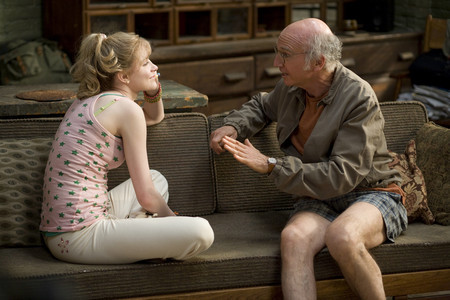‘Whatever Works’
Who says you can't go home again?
Not Woody Allen.
After batting .500 during a four-picture European tour (with "Vicky Cristina Barcelona" and "Match Point" as the hits, "Scoop" and "Cassandra's Dream" as the misses), Allen crosses home plate with another winner: "Whatever Works."
In this case, the title seems particularly apt, considering it's a creaky '70s-era concept Allen excavated from a desk drawer. (It was written for the one-and-only Zero Mostel -- "Fiddler on the Roof's" original Tevye and "The Producers' " first Max Bialystock -- before Mostel died in 1977, the year Allen's Oscar-winning "Annie Hall" arrived in theaters.)
By the time "Whatever Works" goes the full nine innings, however, Woody's made it work.
At least for those of us who still appreciate writer-director Allen for his incisive, insightful view of human nature -- and his trademark unquenchable wit.
"Whatever Works" won't work, of course, for audiences who consider "The Hangover's" let-it-all-hang-out antics the pinnacle of screen comedy.
But for those who long to return to those thrilling days of yesteryear -- and to Woody Allen's magical Manhattan universe -- "Whatever Works" definitely does.
In part, that's because this is the first Woody Allen movie in some time to have a credible, and creditable, Allen stand-in as its star.
That would be "Curb Your Enthusiasm's" Larry David, who (not surprisingly) proves a perfectly kvetchy hoot as "Whatever Works' " resident curmudgeon, Boris Yelnikoff.
A self-described genius who was once Nobel Prize material (or so he claims), Boris has fallen on hard times.
Instead of teaching physics at Columbia University, he's teaching chess to kids (or, as he prefers to call them, "inchworms") in the park.
Boris couldn't even commit suicide successfully. Oh, he managed to jump out the window, all right -- but an awning broke his fall, leaving him with a limp he blames on his doctor. Stranded among the "cretins" and "mindless zombies" of the world (to cite two other terms of endearment Boris regularly hurls at his fellow humans), it's hardly surprising there's no significant other in his life.
That is, until the fateful night Mississippi runaway Melodie St. Ann Celestine (deadpan, doe-eyed Evan Rachel Wood) shows up outside his shabby walk-up apartment, pleading for sanctuary.
Barely out of her teens, Melodie's as intellectually backward as Boris is advanced, making her an ideal target for his hostile rants.
Despite Boris' condescending attitude, however, Melodie nevertheless finds something endearing about her crotchety host, setting up an initially contrived but ultimately revealing relationship.
And she's not the only newcomer to discover New York's quirky charms.
Melodie's Southern belle of a mother, the aptly named Marietta (Patricia Clarkson, a sly delight) soon tracks her missing daughter down -- and overcomes her initial culture shock with undisguised zeal. Even Melodie's wandering father (a garrulous Ed Begley Jr.) discovers an unexpected capacity for change when he hits town.
Hey, whatever works.
In this case, it's Allen's canny narrative approach, which features Boris speechifying directly to the camera. As he shares his hilariously profane insults with us, he transforms us from audience members to co-conspirators who share in his failings.
And, as a result, we not only sympathize but identify with this self-righteous -- and frequently self-deluding -- intellectual boor, who rejects people before they have a chance to reject him.
Unless, of course, those people are as open and innocent as Melodie, who's too naive to feel the sting of Boris' zingers. Until she figures out what's behind them, by which time she demonstrates an emotional maturity Boris could never hope to match.
Serious stuff, to be sure, yet Allen retains his clear-eyed, sure-footed ability to shift between the substantial and the silly with throwaway ease, creating yet another profound -- and profoundly funny -- exploration of what fools we mortals be.
In that sense, "Whatever Works" echoes themes Allen has addressed in numerous triumphs, from "Annie Hall" and "Manhattan" to "Hannah and Her Sisters," "Radio Days" and "Broadway Danny Rose."
"Whatever Works" isn't quite on their level. Precious few movies are.
But it nonetheless emerges as another wise, witty chapter in the collected works of Woody Allen, an epic cinematic opus that demonstrates, beyond a shadow of a doubt, that movies can be light without being slight.
If that doesn't work for you ... whatever.
Contact movie critic Carol Cling at ccling@reviewjournal.com or 702-383-0272.
Carol Cling's Movie Minute
Review
"Whatever Works"
92 minutes
PG-13; sexual situations and references, brief nude images, mature themes
Grade: B+
at Palms, Suncoast
Deja View
"Chapter One: He was as tough and romantic as the city he loved ..." The opening lines of (and the first laugh in) Woody Allen's "Manhattan" suggest Allen's undying affection for his hometown, as captured in these winning comedies:
"Annie Hall" (1977) -- This "nervous romance" between comedian Alvy Singer (Allen) and the title character (Diane Keaton) from Chippewa Falls, Wis., earned Oscars for Allen, Keaton -- and a best picture Academy Award.
"Manhattan" (1979) -- A writer (Allen) dating a high school student (Mariel Hemingway) finds himself drawn to his best friend's current flame (Diane Keaton) in this bittersweet comedy.
"Broadway Danny Rose" (1984) -- Trying to reconcile a has-been singer (Nick Apollo Forte) with his mob-moll girlfriend (Mia Farrow), a small-time talent agent (Allen) runs afoul of a jealous gangster.
"Hannah and Her Sisters" (1986) -- The intertwined lives of neurotic New Yorkers inspire another multiple Oscar-winner, about the title characters (Barbara Hershey, Mia Farrow, Dianne Wiest) and the men (Allen, Michael Caine, Max von Sydow) in their lives.
"Manhattan Murder Mystery" (1993) -- Allen and Keaton reunite for this light-hearted mystery about a married couple who suspect an elderly neighbor of murdering his wife.
-- By CAROL CLING















